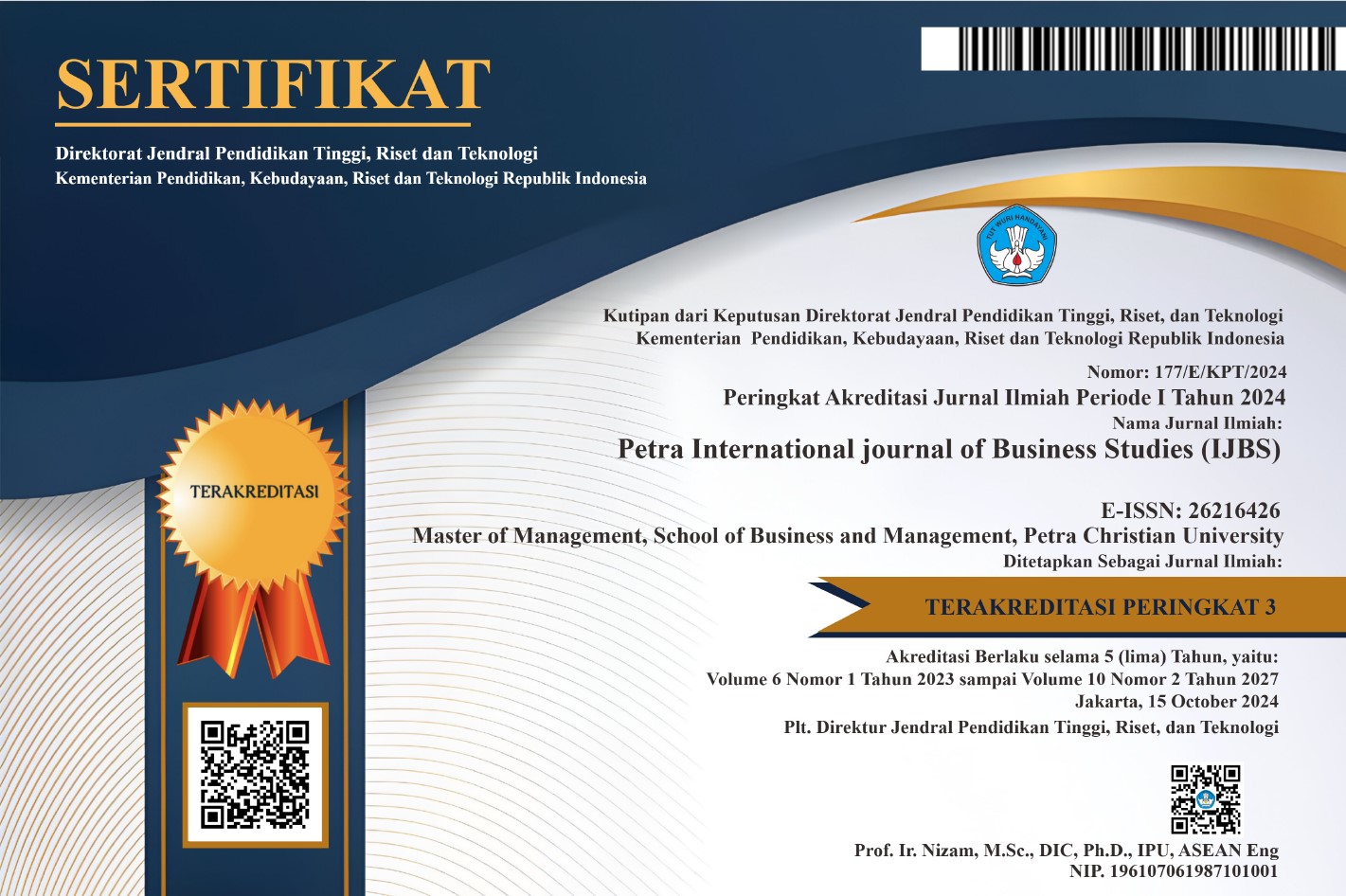The Impact of Corona Virus Disease 2019 (COVID-19) on Indonesia Property Stock Index
DOI:
https://doi.org/10.9744/ijbs.4.2.85-96Keywords:
Event Study, COVID-19, Abnormal Return, Trading Volume ActivityAbstract
A promising investment in the property sector is due to appreciation in property value. As an economic instrument, the stock market, inseparable from different environmental factors, was triggered by incident in Wuhan, Hubei Province, China, an outbreak of acute respiratory tract infection 2 (SARS-CoV-2) in December 2019 and then spread across China. This study is a comparative study on the stock index of the property sector on the stock exchange of countries affected by the Corona Virus Disease 2019 (COVID-19) case, with a purposive sampling technique according to certain criteria for sample selection. The event analysis was performed by analyzing market reaction; with COVID-19 incident effect as one of the event tests, the stock price index. The findings of the study indicate that there is an index response to the incident of COVID-19. The reflected reaction shows in the abnormal return and trade volume activity before and after the incident. Thus, this study is expected to be taken into consideration for stock investors regarding the impact of the Corona Virus Disease 2019 (COVID-19) pandemic on stock prices, by providing an overview of changes in stock prices during the monitoring period, so that they can make investment decisions in the period before and after incident.
Downloads
References
AlAli, M. S. (2020). The Effect of WHO COVID-19 Announcement on Asian Stock Markets Returns: An Event Study Analysis. Journal of Economics and Business, 3(3), 1051-1054.
Al-Awadhi, A. M., Alsaifia, K., Al-Awadhi, A., & Alhammadi, S. (2020). Death and Contagious Infectious Diseases: Impact of The COVID-19 Virus on Stock Market Returns. Journal of Behavioral and Experimental Finance, 27(April 2020), 1-5. doi:10.1016/j. jbef.2020.100326
Anh, D. T., & Gan, C. (2020). The Impact of The COVID-19 Lockdown on Stock Market Performance: Evidence from Vietnam. Journal of Economic Studies. doi:10.1108/JES-06-2020-0312
Ashraf, B. N. (2020). Stock Markets’ Reaction to COVID-19: Cases or Fatalities? Research in International Business and Finance, 54(Dec 2020), 1-18.doi:10.1016/j.ribaf.2020.101249
Baek, S., Mohanty, S., & Glambosky, M. (2020). COVID-19 and Stock Market Volatility: An Industry Level Analysis. Finance Research Letters, 37(November 2020). doi:10.1016/j.frl.2020.101748
Bash, A. (2020). International Evidence of COVID-19 and Stock Market Returns: An Event Study Analysis. International Journal of Economics and Financial Issues, 10(4), 34-38. doi:10.32479/ijefi.9941
Chen, A. H., & Siems, T. F. (2004). The Effects of Terrorism on Global Capital Markets. European Journal of Political Economy, 20 (2), 349-366. doi: 10.1016/j.ejpoleco.2003.12.005
Chen, M. H., Jang, S. C., & Kim, W. G. (2007). The Impact of The SARS Outbreak on Taiwanese Hotel Stock Performance: An Event Study Approach. International Journal of Hospitality Management, 26(1), 200-212. doi:10.1016/j.ijhm.2005.11.004
Dunford, D., Dale, B., Stylianou, N., Lowther, E., Ahmed, M., & Arenas, I. (2020). Coronavirus: The World in Lockdown in Maps and Charts. Retrieved from BBC News: www.bbc.com/news/world-52103747
Fama, E. F. (1970). Efficient Capital Markets: A Review of Theory and Empirical Work. The Journal of Finance, 25(2), 383-417. doi: 10.2307/2325486
Goodell, J. (2020). COVID-19 and Finance : Agendas for Future Research. Finance Research Letters.
Guidolin, M., & Ferrara, E. L. (2010). The Economic Effects of Violent Conflict: Evi-dence from Asset Market Reactions. Journal of Peace Research, 47(6), 671-684. Retrieved from https://www.jstor.org/stable/20798955
Hartono, J. (2015). Studi Peristiwa: Menguji Reaksi Pasar Modal Akibat Suatu Peristiwa. Yogyakarta: BPFE.
Husnan, S. (2005). Dasar-Dasar Teori Portofolio Dan Analisis Sekuritas (4th Ed.). Yogyakarta, Indonesia: UPP AMD YKPN.
Ichev, R., & Marinc, M. (2018). Stock Prices and Geographic Proximity of Information: Evidence from The Ebola Outbreak. International Review of Financial Analysis, 56(March 2018), 153-166. doi: 10.1016/j.irfa.2017.12.004
Kandil Goker, I. E., Eren, B. S., & Karaca, S. S. (2020). The Impact of The COVID-19 (Coronavirus) on The Borsa Istanbul Sector Index Returns: An Event Study. Journal of Social Sciences, 14-41.
Mardy, C., & Angel, Z. (2020). Trading from Home: The Impact of COVID-19 on Trading Volume Around The World. Finance Research Letters.
Mazur, M., Dang, M., & Vega, M. (2020). COVID-19 and The March 2020 Stock Market Crash. Evidence from S&P1500. Finance Research Letters, 38(1), 1-8. doi:10.1016/j.frl.2020.101690
Nia, V. M. (2020). The Effect of Corona Outbreak on The Indonesian Stock Market. American Journal of Humanities and Social Sciences Research, 4(3), 358-370.
Salim, L. (2003). Analisa Teknikal dalam Perdagangan Saham. Jakarta: PT. Elex Media Komputindo.
Samsul, M. (2006). Pasar Modal dan Manajemen Portofolio. Surabaya: Erlangga.
Setyawan, S. A. (2000). Analisis Reaksi Pasar Modal Terhadap Kenaikan Harga BBM (Studi Kasus di Bursa Efek Jakarta untuk Saham-Saham LQ 45). Thesis Universitas Diponegoro.
Sunariyah. (2011). Pengantar Pengetahuan Pasar Modal (6th Ed.). Yogyakarta, Indonesia: UPP Sekolah Tinggi Ilmu Manajemen Yayasan Keluarga Pahlawan Negara.
Takyi, P. O., & Bentum-Ennin, I. (2020). The Impact of COVID-19 on Stock Market Performance in Africa: A Bayesian Structural Time Series Approach. Journal of Economics and Business.
Tandelilin, E. (2010). Portofolio dan Investasi: Teori Dan Aplikasi. Yogyakarta, Indonesia: Kanisius IKAPI.
Additional Files
Published
Issue
Section
License
Petra IJBS (e-ISSN: 2621-6426) is published by Master of Management program, School of Business and Management, Petra Christian University, Indonesia (MM SBM PCU).












